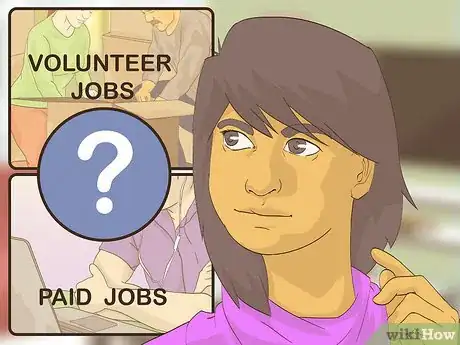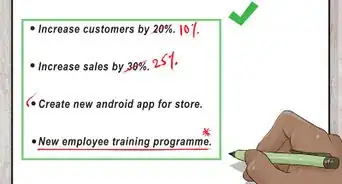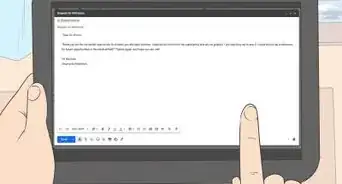This article was co-authored by Elizabeth Douglas. Elizabeth Douglas is the CEO of wikiHow. Elizabeth has over 15 years of experience working and managing teams in the tech industry. She has held roles in multiple areas, including computer engineering, user experience, and product management. She received her BS in Computer Science and her Master of Business Administration (MBA) from Stanford University.
This article has been viewed 210,886 times.
Whether you're looking for work or working in a secure position, it never hurts to consider job positions that are right for you. In a time when you'll almost certainly change careers before you retire, this evaluation is actually a smart idea. Choosing the the right position boils down to evaluating your personality, assessing your qualifications, and exploring job listings. Once you get started, you'll see how easy the process is. You might even find it quite enjoyable!
Steps
Evaluating Your Personality
-
1Assess your lifestyle needs. Consider how important the work-life balance is to you. Ask yourself if you could accept regular overtime at the expense of time with your loved ones. Think about how much control you would like over decisions about your work-life balance. Consider what you need to live comfortably. Reflect on whether you must be affluent or if you just need the basics.
-
2Evaluate your passions. Finding a job you enjoy can do wonders for your productivity. Think about the duties you enjoyed in past paid or volunteer jobs. Ask yourself if you prefer working with people or things. Consider whether you prefer thinking or creating. Think about the industries that appeal to you.[1]EXPERT TIPElizabeth Douglas is the CEO of wikiHow. Elizabeth has over 15 years of experience working and managing teams in the tech industry. She has held roles in multiple areas, including computer engineering, user experience, and product management. She received her BS in Computer Science and her Master of Business Administration (MBA) from Stanford University.CEO of wikiHow

 Elizabeth Douglas
Elizabeth Douglas
CEO of wikiHowThink about what really speaks to you. Elizabeth Douglas, the CEO of wikiHow, says it's important to pursue what excites you. She says, "When you're looking at job postings, listen to your heart about which ones jump out at you, or that you're still thinking about 2 days later. Also, talk to people to find out what they love and don't love about their jobs. Figure out which stories resonate with you and make you feel like you would fit in."
Advertisement -
3Take a personality test. Look into options such as the RIASEC/Holland Interest Scale or the Myers-Briggs Type Indicator (MBTI). You can find many free versions on the web. The RIASEC scale will determine whether you're realistic, investigative, artistic, social, enterprising, or conventional. The MBTI will help you figure out whether you're introverted (shy) or extroverted (outgoing).[2]
-
4Discover your motivation type. The two most common motivation types are promotion-focused and prevention-focused. You're promotion-focused if you're creative, impulsive, and enjoy trying new things. Consider fast-paced and evolving fields like social media and the tech sector. You're prevention focused if you prefer planning ahead of time and always paying attention to detail. Consider a job with set hours in fields like law or data analysis.[3]
-
5Examine your long-term goals. Make a list or write a journal entry detailing where you'd like to be in 10 years. This will help you to decide between two or more job offers. For example, you could receive one job offer with a high salary that doesn't quite mesh with your 10-year plan. Another offer could pay a lower salary but be right up your alley goal-wise. If you're really thinking long-term, you should take the second offer.[4]
Assessing Your Qualifications
-
1Write down your work experience. If you've already created a custom résumé, you've listed your most relevant experience tailored to a job opening. Try composing a master résumé that lists every job you've had. Chances are, you'll be able to spot connections you didn't think of before. You might even discover qualifications you never though you had.[5]
-
2Examine your education. Don't just stop at your degree or professional certificate. Think about the transferrable skills you perfected as a student. Perhaps you excelled at argumentative writing or discovered a hidden talent in a studio art class. Maybe you participated in extra curricular activities that honed your leadership skills. Take your entire academic experience into account.
-
3Get help from professionals. These days, there are many consultants and coaches who can help you analyze your qualifications.[6] Look for professionals who specialize in the field you're interested in. Search online for free webinars tailored to people with your background. Many colleges and universities offer free job search assistance to their alumni. If you live near your alma mater, make an appointment at the campus career center.
-
4Seek opportunities to gain more skills. Even if you already have a job, you can use your spare time to increase your know-how. Ask your employer if there are any on-the-job training opportunities you can take advantage of. Volunteer for a local charity or business a few hours a week. Take night or weekend classes at your local community college.[7]
Exploring Job Listings
-
1Filter your searches by location. Most job search sites allow you to choose one or more locations to limit your search by. Figure out the maximum round-trip distance you're willing to travel each day. Consider whether you're willing to relocate, especially if your dream job is in another state/province or country.
- Pay attention to travel requirements if you're a single parent or caretaker. Consider who will care of your child, parent, or chronically ill companion animal if you have to travel frequently.[8]
-
2Weigh the importance of benefits. Regardless of your age, you should take health insurance and the retirement package into consideration. Benefits that depend on your personality- and motivation types include extended vacation time, flexible work days, and telecommuting. If you're promotion-focused, you might enjoy flexible hours. On the other hand, if you're social, you might prefer to avoid telecommuting.[9]
-
3Look for opportunities for advancement. Read your 10-year plan against the company description. Research whether the company has a mentoring program or offers professional development workshops. Opportunities like these will allow you to improve your skills on the job and better prepare you for future in-house openings that might meet your future goals.[10]
-
4Pay attention to the responsibilities. Your responsibilities on the job should mesh with your skills and/or education, at least to some degree. For example, if you're fresh out of law school, you probably won't make partner just yet. However, you don't want to be a paper pusher, either. On the other hand, if you've been in the field for a while, you should expect your responsibilities to be higher up the professional ladder.[11]
-
5Examine the work environment. Figure out if it's compatible with your personality- and motivation types. For example, you might be a prevention-focused introvert. Ask yourself if a boisterous, fast-paced environment of a dot.com startup is worth the potential clash with who you are.[12]
-
6Assess job security. Research the company. Look into its financial stability and reputation, since these usually indicate how long it will be around. Consider your motivation type in your assessment. For example, if you're prevention-focused, you should apply for a job that's going to be there for the long term. On the other hand, if you're promotion-focused, you might anticipate looking for a new job after a couple years.[13]
References
- ↑ https://www.job-hunt.org/career-change-self-assessment/
- ↑ https://www.helpguide.org/articles/work-career/finding-the-right-career.htm
- ↑ https://www.forbes.com/sites/heidigranthalvorson/2013/04/18/the-surprising-key-to-finding-the-right-job-for-you/#1b8a46f44672
- ↑ http://www.kiplinger.com/article/business/T012-C006-S001-how-to-choose-the-right-job.html
- ↑ http://www.manifestyourpotential.com/work/take_up_life_work/8_get_hired/how_to_create_master_resume.htm
- ↑ https://www.monster.com/career-advice/article/find-the-right-coach-for-you
- ↑ https://www.helpguide.org/articles/work-career/finding-the-right-career.htm
- ↑ http://www.kiplinger.com/article/business/T012-C006-S001-how-to-choose-the-right-job.html
- ↑ http://www.kiplinger.com/article/business/T012-C006-S001-how-to-choose-the-right-job.html
- ↑ http://www.kiplinger.com/article/business/T012-C006-S001-how-to-choose-the-right-job.html
- ↑ http://www.kiplinger.com/article/business/T012-C006-S001-how-to-choose-the-right-job.html
- ↑ http://www.kiplinger.com/article/business/T012-C006-S001-how-to-choose-the-right-job.html
- ↑ http://www.kiplinger.com/article/business/T012-C006-S001-how-to-choose-the-right-job.html










































































